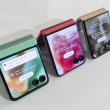LG VX-8100
Info
Photos
News
Forum
Reviews 100+
‹ all discussions
HELP!!! I think I've made a costly mistake!
This is NOT a rant/complaint and I will be posting this same thread on the VZW forum.
I've been with VZW for a month now coming from Cingular. I left them after 6 years because of lame CS and MANY full-bar dropped calls.
I love everything about VZW EXCEPT the clarity of most of my calls --which is not a minor problem.
I've gone back and forth all month, doing comparisons between both providers while I still had Cingular --and although I found the CDMA quality to be a bit "darker" than the GSM, over 50% of the time my calls sound like mumbling, as if the callers have their hands over their mouths.
I also get the "gargling" effect as well.
Is this truly what VZW quality is about? Or is it just this model phone?
I initially th...
(continues)
...
I have been using VZW for years. I was a beta tester when they first went digital. I am in the KC metro area, and have always had excellent reception and call quality. Prior to the 8100 I used a LG 4400 and feel that was the best phone I have had, out of a dozen different models. I was having some of the same problems you mention when I first got the 8100. I finally got in contact with a tech, at 611, who really seemed to know his stuff. He said I definitely had a bad phone, and to exchange it at my local store. I did, the next day, and call quality and reception were greatly improved. I know that service from other carriers can be better in certain geographic areas, but I would try getting your phone replaced before giving up on VZW ...
(continues)
...
In general, GSM sound quality, is a lot better. I, personally have never experienced bad quality with CDMA, except for occasional feedback. Never had static, like others, I've heard. Location is a big factor for connection and clarity. NE is supposedly better for CDMA and mid west and wast swear by GSM. I hate VZW greed and power but would never go Cingular while living here.
...
The world's first cellular networks introduced in the early 1990s, used analog2 radio transmission technologies. Within a few years, millions of subscribers signed up for service provided by the cellular networks, and demanded more and more airtime3. As a result, dropped calls and network busy signals became common in many areas.
To accommodate more calls within the limited amount of radio spectrum4 available, the industry developed a digital5 wireless technology called GSM (Global System for Mobile Communication). Today, most of the cellular phones in the world, outside the U.S., use GSM technology. GSM, one of the oldest technologies used by the cellular industry, is considered to be very dependable technology. By the beginning of the 2...
(continues)
...
Thanks very much for the article, AllOne --but I'm not going to simply live with my bad signals just because I know CDMA is supposed to be the superior technology.
Upon everyone's advice, I will try exchanging my phone and see what happens.
Thanks again, though.
...
‹ all discussions




